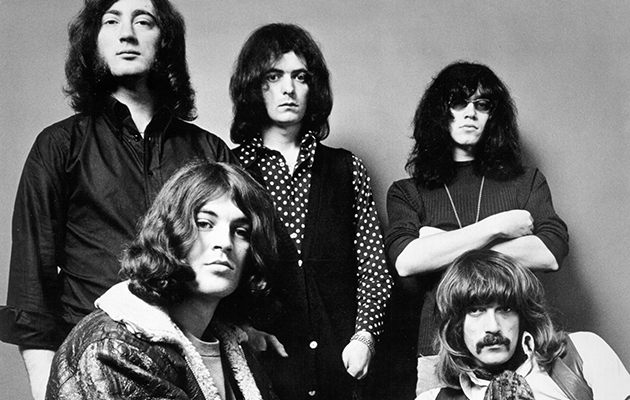GLOVER: We finished the music about 1am. Gillan and I sat down on the floor with our back to this big pillow. We thought that the title of the Arthur Alexander tune “Black Night” was pretty good, so we stole that. We were having a laugh, because we thought the whole thing was a waste of time now, so we wrote the most banal lyrics we could. We just banged it out. I went to bed that night thinking, ‘That’ll be some obscure B-side or something.’
PAICE: We never saw singles, trying to find them… you’d see the wood, not the trees. “Smoke On The Water”, we thought, was just an album track. It took an exec at Warners in the US to say, “We’ll edit it and put it out as a single…” We didn’t see it. We thought “Never Before” was the single – if you listen to it now, it’s the weakest track on Machine Head. Leaving the commercial decisions to other people seemed to work a lot better for us. We didn’t see it. We were playing music, having a ball. Recording was a necessary evil, but the fun was playing and touring.
GLOVER: The management were over the moon. They said, “That’s it, you’ve done it.” We said, “You can’t release that, we were pissed.” But they did, and it changed our lives. It bears out the philosophy I have that what you do when you’re not looking is much better than what you do when you are… if you use your brain in music, it’s all over. Your first aim is best. I don’t remember putting them on, but there are handclaps on there.
GILLAN: It’s got handclaps on it? Wow! I don’t think we were anti-commercial. But we were anti-contrivance, and like Zeppelin, we found dignity throught the music we were playing. It wasn’t slung together by a producer and a publisher. We decided we were going to take hold of our music and let it evolve organically.
PAICE: With all the great stuff, you do get the odd problem. Like when you’re mixing, and you’ve got three guys saying “My bit’s more important than yours.” There’s Martin Birch trying to keep sanity, with five pairs of hands on the faders. Sometimes it was to the detriment of the end product, but if you’re proud, you do want it to be heard. There can be a bit of a fight on the faders.
GILLAN: Martin was new school. We’d all been through the BBC audition and the pipe smokers in the control booth. It was a load of Horlicks – the way things were. Like all young vandals, we wanted to have it our way. Martin was one of the new-thinking engineers. He understood that with electric guitar and with drums playing in an abandoned fashion, you needed a new approach. We tried to get a live feel – the purpose of engineers up to then was to throw a blanket over everything so you had a bone-dry sound.
PAICE: Martin became like the sixth member of the band – he would have a word. When you have some prickly personalities, that stranger in the room can smooth the waters. He was incredibly aware. His attention was great.
GLOVER: We did Top Of The Pops after it had become a hit – you have to support the record, but we made our point by not plugging our guitars in. We didn’t take it too seriously. We wanted to be ourselves and not pushed into any… slot.
GILLAN: I know Ritchie hated TOTP – it was associated with pop. Rock music had its own constituency, its own steering wheel. It was beyond the control of the establishment, and we saw TV as the enemy. Later on in some territories, it became very significant. We close with it in most places. “Smoke On The Water” is in the set, but “Black Night”… people go home singing that riff!



